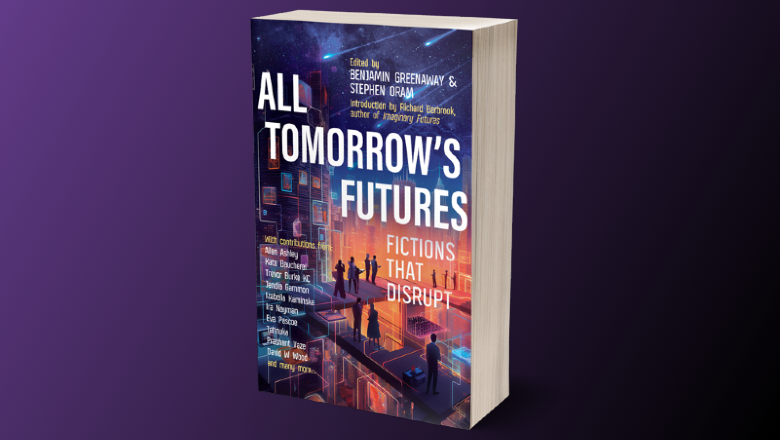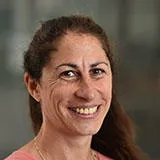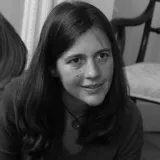What a wonderful and inspiring alternative to the so-called 'world-building' of today's science fiction industry. Here are some real lessons on how to speculate in ways that may actually open new potentials for human flourishing.
Douglas Rushkoff
04 April 2024
King's academics look into crystal ball in new future gazing sci-fi anthology
Researchers in AI from across three different faculties provided expert reflections on energy, healthcare and education in the near future

King’s researchers have contributed to a new sci-fi anthology, All Tomorrow’s Futures: Fictions That Disrupt, released on 31 March 2024.
The collection of short stories from award-winning science fiction writers informed with commentary from experts in science, technology and society, explores the possible futures which await humanity as a consequence of technological development and scientific progress.
The King’s writers include Dr Christine Aicardi and Dr Elizabeth Black from the Department of Informatics; Dr Gabrielle Samuel from the Department of Global Health and Social Medicine; and Professor Claire Steves from the School of Life Course & Population Sciences.
The anthology, produced by independent publisher Cybersalon Press, presents short stories set in the 2050s and accompanying expert commentary on key themes such as Police and Justice, Power and Energy, Finance and Digital Money, Health and Longevity, and Learning and Education. Each story peels back the layers of speculative fiction to ground the work in real-world research to educate, as well as entertain, readers about the possible near future.
Dr Gabrielle Samuel, Lecturer in Environmental Justice and Health, provided commentary on the theme ‘Power and Energy’, examining issues of digital ethics, sustainability and the environment. Her insights accompany dystopian tales of social, economic and political hardships, providing reflections from her academic viewpoint on the fictions created.
One story depicts a future London where AI is governing an inequitable society in which electricity and food are in short supply, and environmentally damaging food production and consumption are moralised, and even criminalised. Another follows a group of ultra-wealthy individuals who have shirked their responsibilities towards environmental harms by transforming their cruise liner into a tax haven free from climate laws.
‘Working with science fiction writers was such an enjoyable experience! I found it so fascinating to see the imagination of these authors first-hand, and how the stories brought to life the types of ethical and social issues I research and engage with every day.’
Professor Claire Steves, Professor of Ageing and Health, contributed to the anthology with reflections on the implications of emerging technologies, including AI, on health and longevity.
‘Working with these science fiction writers was nerve wracking, but fun and ultimately thought provoking. These sorts of cross-disciplinary interactions help us to open our minds further to the possibilities and impact of our science.
This anthology uses the power of its writers’ imaginations to encourage us all to think about our futures and what we can do to shape them.’
Dr Elizabeth Black, Reader in Artificial Intelligence, supported five writers with academic insight to develop their stories via workshops, before providing her own response to the speculative fictions.
The stories in the ‘Learning and Education’ theme revolve around the intricate relationships between humanity and future technologies, each presenting a unique perspective on how individuals interact with and perceive these advancements.
Here, the writers draw out issues such as human-machine collaboration, companionship, the potential for technology to support individuals with diverse needs, environmentalism, and the nature of identity in the digital age.
'We must continue to reflect on the possible impacts of AI on society, and this needs to be a collective responsibility. The stories in All Tomorrow’s Futures raise some fascinating questions, and being involved with this book has exposed me to new perspectives on the consequences of AI. I hope the stories inspire people to get involved in conversations about AI and its impact on our society, today and in the future.’
Dr Christine Aicardi, Senior Research Fellow and Responsible Research & Innovation Lead for the Centres for Doctoral Training in Safe & Trusted AI and in Smart Medical Imaging, wrote the postface for All Tomorrow’s Futures and provided expertise and reflection on participatory foresight to the anthology.
‘My research looks at engaging people to think critically about our shared social and technological future. By presenting a brand of futures suited to the often uncertain, volatile, complex, interrelated world we’re living through now, All Tomorrow’s Futures lets us think seriously, but playfully, about the better future we want to build together.’




